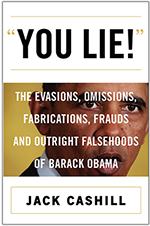Purdue, Mizzou and the Sanity Gap: How Two Midwest Universities Handled the Same Inane Problem
Order Jack Cashill's newest book,
Scarlet Letters
___
Get your copy of Jack Cashill's book, "You Lie!"

___
Get your copy of Deconstructing Obama

___
Jack Cashill's book:
Hoodwinked: How Intellectual Hucksters have Hijacked American Culture
© Jack Cashill
HNGN.com - December 21, 2015
This semester has seen impressively puerile flare-ups on college campuses across the country. On no two of those campuses have university brass responded in more dramatically different fashion than they did at Purdue University and at the University of Missouri.
What makes their respective responses so instructive is that Purdue and Mizzou have much in common. Each is a publicly funded university in a red-leaning, Midwest state. Their demographics match up closely. In 2012, for instance, Mitt Romney outpolled Barack Obama by 54-44 margins in both Indiana and Missouri.
Yet while the Mizzou Board of Curators was busily throwing its weak-kneed system president to the student wolves, Purdue president and former Indiana governor, Mitch Daniels, was defiantly holding those wolves at bay.
Indeed, during the height of the Mizzou mayhem—with the football team threatening to strike, a journalism prof flexing her “muscle” against students journalists, and the system president and campus chancellor negotiating their severance packages—Daniels sent out a letter explaining how grown-ups handled such problems.
They handled them, said Daniels, by being “steadfast in preserving academic freedom and individual liberty.” Daniels’ stand took some forethought. Two years earlier, a student-led initiative created a statement of values “protecting free speech.” The following year the undergraduate and graduate student governments reinforced the policy. Said Daniels with in-your-face insouciance, “What a proud contrast to the environments that appear to prevail at places like Missouri and Yale.”
A week after Daniels took his stand, the members of Purdue’s Student Justice Coalition decided to challenge him. Like comparable groups across the country, the Purdue protestors went to their president’s office, the student newspaper reports, “to demand changes to the racial climate at Purdue.”
Not keen on the idea of “demands,” Daniels told the protestors that most people “respond far better with suggestions, recommendations or constructive proposals than what they are told are demands.” He added wryly, “Just a modest suggestion.”
When told the protestors were not there to negotiate, Daniels surprised them by saying he was not there to negotiate either. “You need to understand this at the outset,” he told them. They could try to identify areas of common agreement if they wished, but if not, there wasn’t much to talk about.
As to the larger question of whether there was racism on campus, Daniels made the obvious point that these protestors found would be hard pressed to find “another community of people” less racist than those on a college campus.
Would that some adult at the University of Missouri had made this point months ago! What triggered the upheaval at Mizzou was the claim, unverified, that that people in a passing pickup truck shouted racial slurs at a black male student. That was pretty much it.
The incident prompted an impassioned “Racism Lives Here” rally on campus. Someone might have asked rally organizers how so racist a campus could have elected the slur’s victim, a gay man at that, both student body president and homecoming king.
This fellow, by the way, later claimed that the KKK was on campus, for which lie he was forced to apologize. Indeed, there is no reason to believe he told the truth at the outset, but truth is often the first casualty of war, culture wars included.
In the way of disclosure, I have a Ph.D. from Purdue. That said, I live in Missouri and have taught occasionally in the MU system, in which system my wife is a professor.
Last year, I spoke to the Purdue Club at The Villages in Central Florida. The topic of my (unusually prescient) speech was the “Sanity Gap.” I described it as the socio-cultural distance between the typically insane university campus and the relatively grounded Purdue campus, a place Newsweek once called “a hotbed of student rest.”
At the time, little did I anticipate that the gap would yawn widest—and most improbably--between my alma mater and my adopted Mizzou. If I were Mizzou, I’d work to erase it. If I were Purdue I’d use it as a recruiting tool.



